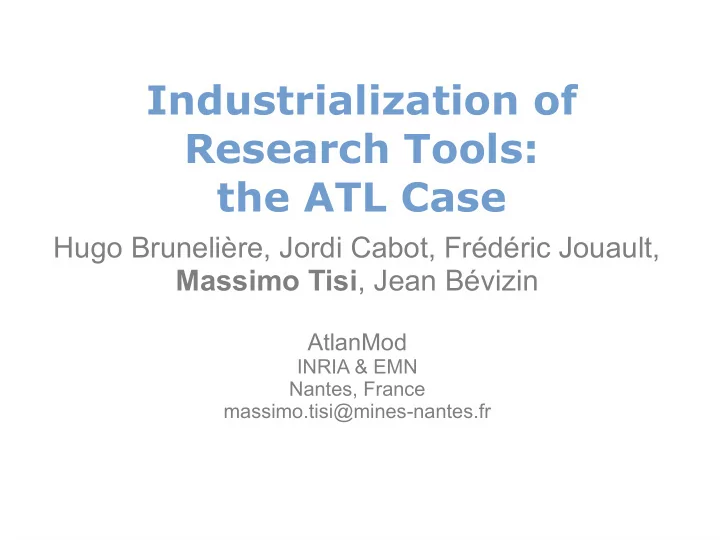

Industrialization of Research Tools: the ATL Case Hugo Brunelière, Jordi Cabot, Frédéric Jouault, Massimo Tisi , Jean Bévizin AtlanMod INRIA & EMN Nantes, France massimo.tisi@mines-nantes.fr
Research tools in SE Tools as proofs of concept for research ideas A large user base would produce: empirical validation of research feedback visibility collaboration opportunities Unfortunately... ATL Industrialization - 2/32
...resources are limited! Research groups focus on core research activities also because of funding criteria Companies don't adopt the tool because it lacks: responsive user support complete and up-to-date tool documentation ergonomy long-term perspectives frequent upgrades interoperability with other tools extensibility, adaptability, and other -ities backward compatibility ATL Industrialization - 3/32
Open Source is not enough An open source license is not enough: i only few projects are successfully involving external contributors [S. Krishnamurthy, Cave or community? an empirical examination of 100 mature open source projects] external users prefer to work on challenging tool features e.g. other research groups ATL Industrialization - 4/32
Our context: MDE Model Driven Engineering models as primary artifacts in SE growing industrial interest without tools monopolizing the market Metrics Docs Test ... cases System ATL Industrialization - 5/32
Our research tool: ATL Model-to-model (M2M) transformation language production of target models from source models a set of declarative rules that match a subset of the source model create an excerpt of the target model ATL Industrialization - 6/32
A look to ATL ATL Industrialization - 7/32
History of ATL 2003 : Phd of Frédéric Jouault 2004 : French project CAR-ROLL/MOTOR 2004 : ATL in the Eclipse-Modeling GMT project 2004-2006 : MODELWARE European integrated project 2006 : Eclipse M2M (Model-to-Model Transformation) project 2006-2010 : MODELPLEX European integrated project ATL Industrialization - 8/32
ATL Today ATL is the most popular model-transformation toolset today Full Eclipse project ATL IDE Editor, debugger, compiler, profiler, etc.. Documentation user guide, developer guide, tutorials, more than one hundred open source transformations, etc... Community Eclipse forum, mailing list, bugzilla, wiki, etc.. ATL Industrialization - 9/32
How did we make it? 2. Business model 1. Tool design ATL Industrialization a) Modularity b) Standard technologies c) Interoperability d) Eating your own dog food ATL Industrialization - 10/32
1. Tool Design ATL Industrialization - 11/32
a) Modularity Modular structure + Eclipse extension mechanism ATL Industrialization - 12/32
b) Standard technologies Eclipse open development framework solid open-source community, standard platform standard extension mechanism (based on OSGi) EMF De facto standard solution for model handling today ATL Industrialization - 13/32
c) Interoperability Maximum independence from specific technologies Java .NET → longevity Eclipse EMF Microsoft DSL Tools → portability Netbeans MDR Example: the ATL Virtual Machine Specific for model manipulation to support a new model management system → new Model Handler Abstraction Layer to execute ATL transformations in other environments → porting the VM ATL Industrialization - 14/32
d) Eating your own dog food Research groups as the first users of the tool If possible, for building the tool itself (bootstrapping) Benefits a non-trivial test for the tool an improvement to a tool component improves all the toolsuite ATL Industrialization - 15/32
2. Business Model ATL Industrialization - 16/32
ATL Industrialization + Benefits for AtlanMod Benefits for Obeo Focus on new research ● Strategic positioning among activities industries that use Eclipse ATL reaches an industrial modeling ● Obeo becomes the lead quality attracting company users and a stable user ATL training company ● ATL completes the base proprietary Obeo offering ● Privileged relationship with the creators and lead research contributors of ATL ATL Industrialization - 17/32
Obeo responsibilities 1) Quality assurance reactively (bug reporting and correction) proactively (optimization, e.g. scalability) 2) Interoperability 3) Continuity 4) User experience ergonomy, wizards, internationalization, etc.. 5) Release management defining milestones, building, testing, packaging and distributing 6) User support documentation, free and subscription-based support and training ATL Industrialization - 18/32
ATL Research ATL Research specific versions for particular projects if interesting for the general public, they move in ATL by directly importing or re-engineering by Obeo Both have open-source licence every update can be transferred between branches third parties are guaranteed that any contribution will benefit the whole research community ATL Industrialization - 19/32
Replicating the process We are replicating the industrialization model for: MoDisco (software modernization tool) with Megamodeling (model management approach) with The model can be generalized: ATL Industrialization - 20/32
Industrialization Triangle 1.Big users describe a challenging problem e.g. the industrial use cases at the beginnings of ATL ATL Industrialization - 21/32
Industrialization Triangle 2.The lab decides whether it is a relevant research problem ATL Industrialization - 22/32
Industrialization Triangle 3.If it is, the lab conducts the research (publishes papers) implements a proof-of-concept ATL Industrialization - 23/32
Industrialization Triangle 4.The big company decides whether to request an industrialized version ATL Industrialization - 24/32
Industrialization Triangle 5.In that case, the big company, with the help of the research lab, selects a technology provider ATL Industrialization - 25/32
Industrialization Triangle 6.The lab assists the technology provider during the industrialization ATL Industrialization - 26/32
Industrialization Triangle 7.The technology provider releases the tool ATL Industrialization - 27/32
Industrialization Triangle Open source is not mandatory but facilitates communication maximizes benefits the research group distributes the code when publishing papers the technology provider commercializes adaptations for other companies with the same problem ATL Industrialization - 28/32
All together Application-driven research ensures return of investment for technology provider ATL Industrialization - 29/32
Summarizing Our contribution: 1.Experience with the industrialization of ATL Design principles Business model 2.Proposed model Industrialization of the research prototypes thanks to the partnership with a technology provider Validated in ATL and replicated in other projects ATL Industrialization - 30/32
Future work Formalized protocol for tool industrialization investigated in the OPEES European project For ATL: Fine-grained extension system for the ATL core ATL Labs Web-based collaboration platform for ATL extensions users compose specialized extensions to get a specific ATL “flavor” ATL Industrialization - 31/32
Thanks
Recommend
More recommend